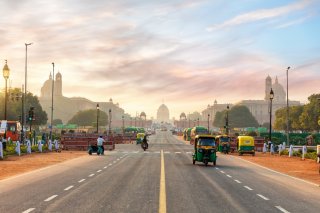Despite Maldives’ Embrace of China, India’s Sphere of Influence Remains Intact
While brazen, Maldives’ president Mohamed Muizzu’s pro-China stance will run into serious opposition soon enough.
When the new president of the Maldives, Mohamed Muizzu, took power less than four months ago, his anti-India stance altered the fragile state of India’s sphere of influence in its own backyard. Running on a firm pro-China “India Out” platform, Muizzu has taken deliberate steps to lessen the island nation’s dependence on New Delhi. This includes expanding healthcare coverage beyond India to include the United Arab Emirates and Thailand and increasing agricultural trade with Beijing, most notably in critical staples like rice, sugar, and flour.
But as benign or pragmatic as these moves may appear, Muizzu’s other anti-India moves may appear to have serious security consequences, but this narrative can be deceiving.
Much like Sri Lanka, another South Asian island nation just off India’s coast, the Maldives has been the target of aggressive yet persuasive Chinese infrastructure diplomacy. The Chinese leased Feydhoo Finolhu Island until 2066 for just $4 million, planning to increase the size of the island three-fold. However, Beijing’s purpose is still not entirely known. China is now the largest creditor to the Maldives at $1.37 billion or twenty percent of public debt, well ahead of both Saudi Arabia and India.
Further, the rift between India and the Maldives has resulted in Muizzu calling for the withdrawal of the seventy-seven Indian troops stationed in the archipelago by March 15. The Indian personnel have been stationed there since Mohamed Nasheed’s presidency in 2010. Nasheed, who had much more robust relations with India, recently condemned remarks by Maldivian Youth Empowerment Minister Mariyam Shiuna, who called Indian Prime Minister Narendra Modi a “clown,” “terrorist,” and “puppet of Israel,” in part an overreaction to Modi’s early January visit to India’s own beaches in Lakshadweep, which prompted calls for tourism boycotts by Indian nationals.
It is likely, however, that the economic impact of this row will be short-lived, as economic dependence is a long-term consideration for the Maldives, and Indian public reactions to criticisms of Modi are often fleeting. India remains the top supplier of tourists to Maldivian beaches, while Indian airlines run most flights to and from the two countries. Consequently, if turmoil in the medium-term has major disruptions to economic stability in the Maldives, Muizzu’s anti-India agenda could quickly run afoul of a beleaguered public.
Initial tremors erupted when the Maldivian Democratic Party (MDP) candidate defeated the Muizzu government-endorsed candidate in a landslide victory in the prestigious Male city council earlier this month. Furthermore, the government faces a very stiff challenge in the forthcoming March 17 Parliamentary (Majlis) election from the pro-India MDP, which currently holds the majority, making it a referendum on Muizzu’s “India-Out, China-In” policy.
If there is a concern for India, it is in the abrupt shift in Male’s defense policy, which had been unabashedly linked to India. Muizzu has calculated that China’s presence in India’s backyard has opened an opportunity to increase strategic competition at New Delhi’s expense, exploiting both Hindu nationalism and the largely Muslim population in the Maldives, which has had difficulties containing extremism. The saving grace for Modi is that Muizzu’s turn toward China is partly rhetorical, as there is an opportunity for the United States and Japan to assist Male with its defense capacity. Thus, as far as defense and security are concerned, Male’s anti-India rhetoric is more likely an attempt at diversification rather than a complete realignment away from India.
Notwithstanding this, a communique from China’s Ministry of Foreign Affairs released in October 2023 confused regional dynamics. The declaration states, “China will work with regional countries to manage regional security affairs with a coordinated approach.” This may create apprehensions among the small island states dependent on external aid and under intense pressure from climate change. Concerns loom that the external aid will be subject to compromises on sovereignty with projects like the Belt and Road Initiative that often lead to debt traps.
At the same time, Australia, India, Japan, and the United States favor the status quo and a rules-based order in the region. Consequently, the Muizzu government’s engagement with China maybring pressure on the Maldives similar to that in Sri Lanka, which reached the verge of bankruptcy, received limited assistance from China during its financial crisis, and was under public pressure to swing back to India.
Against the unfolding events, Modi has responded in a calculated manner while retaining regular food and related supplies. He also engages at a high level diplomatically without publicly criticizing the Muizzu government or its ministers. This constructive approach has yielded a heated debate in the Maldives, where opposition political parties have publicly criticized Muizzu’s policy postures of insulting India and inviting China, Turkey, and Saudi Arabia into the Indian Ocean, a traditional Indian sphere of influence.
India may simply wait, watch, and continue diplomatic negotiations. In the dire event of failure where China demonstrates an excessive presence in India’s immediate vicinity, India will initiate a soft embargo process, enhance its naval presence in the region, and boost its long-standing public narrative of historic relations between Maldivians and India. The latter could blame the downturn in bilateral relations on the irrational policy choices of the Muizzu government.
In this test of political will, Muizzu’s anti-India policy will likely be short-lived. The consequences of his attempt at luring China could have a devastating impact on his own political future.
Mark S. Cogan is an Associate Professor of Peace and Conflict Studies at Kansai Gaidai University based in Osaka, Japan and a former communications specialist with the United Nations. Follow him on X @
Dalbir Ahlawat is a Senior Lecturer at the Department of Security Studies and Criminology, Macquarie University, based in Sydney, Australia, and a recent Japan Foundation Grant recipient.
Image: Shutterstock.com.

